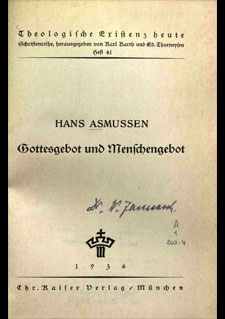Divine Commandment and Human Commandment
Hans Asmussen’s treatise “Gottesgebot und Menschengebot” (Divine Commandment and Human Commandment) appeared in the series “Theologische Existenz heute!” in 1936. As in his contribution to the “Second Provisional Church Government’s memorandum to Hitler” (1936), he took unconditional duty to God’s commandment as his point of departure for his argumentation.
In his view, the German Christians’ church policy no longer clearly enough recognized the distinction between commandment and secular law Luther had called for in the reformed sense. Cooperation in the church committees formed by Reich Minister of Church Affairs Kerrl was therefore out of the question for Asmussen.
The “duty to God’s commandment” additionally played a special role in the issue of the oath. Asmussen believed that an ecclesiastical oath of loyalty to Hitler represented a dangerous conflation of the two spheres of human and divine order.
Instead, he demanded that pastors swearing the oath of loyalty swear in God’s name not to do or to tolerate under any circumstances whatsoever anything in their exercise of their duty to the state, which went against God’s revelation in Christ. Instead, in the case of a conflict, an oath of loyalty to Hitler would be regarded as not having been sworn. The conflation of divine and human commandment in the issue of the oath was especially dangerous because voices in state and party life are increasing, which ascribe traits and nomina to the Führer and his deeds, which, in the Christian church, may be applied only to God.
This harsh criticism of the religious character of Führer worship and its demand of the Christian conscience caused Asmussen’s treatise to be banned quickly. The copy pictured here comes from the library of Wilhelm Jannasch, another collaborator on the memorandum to Hitler.
Source / title
- © Universitätsbibliothek München (BB 8788-41)

